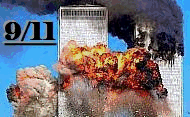 webradio
webradio (deutsch)
(deutsch) michael moore
michael moore  Mondlandungs Lüge
Mondlandungs Lüge (deutsch)
(deutsch)

 Tages-Anzeiger online
Tages-Anzeiger online

|
marcosolo, 2. Mai 2007 um 20:32:44 MESZ
Bangkok gets that sinking feeling BangkokPost.com from Reuters reports Thailand's best known disaster prognosticator said on Wednesday global warming will put Bangkok a metre under water in less than 20 years, adding: "You will need a motorboat instead of a car." Smith Dharmasaroja, head of Thailand's National Disaster Warning Centre, told the Reuters news agency that rising seas and natural sinking will put Bangkok under water by 2025 - unless work starts now on a huge dyke to protect the capital. "If nothing is done, Bangkok will be at least 50 centimetres to one metre under water," Reuters quoted Mr Smith as saying during an interview in Bangkok. Mr Smith gained notoriety 12 years ago when he predicted Thailand was in danger of being hit by a tsunami. Largely dismissed as a crackpot and retired from government service with the Meteorological Department, he was brought back as a disaster expert after the 2004 tsunami, which killed more than 5,000 people in Thailand alone. The problem, he says, is two-fold. The city is subsiding at a rate of 10cm per year, partly due to excessive pumping of underground water. Global warming is causing seas to rise and there is evidence of severe coastal erosion just downstream from Bangkok. To avert disaster, Smith said, the city needed to construct a massive dyke to protect it from rising seas and increasingly violent storms. "The system has to be started right now. Otherwise it will be too late to protect our capital city," he said. Mr Smith, as usual, was scathing when asked about how authorities are facing the threat. "The government does not pay any attention at all." ... Link marcosolo, 12. Mai 2005 um 19:55:43 MESZ Thai-news - Police 'pocket up to B31bn' New studies tally up income from graft PREEYANAT PHANAYANGGOOR Police corruption is under scrutiny again with new studies claiming officers pocketed up to 31 billion baht in illegal income from the underground economy in 2003. Academic Sungsidh Piriyarangsan, an expert on the underground economy, said his research on ''police, mafia and the black economy'', found that police earned up to 31 billion baht in extra income, mainly from illegal businesses. They earned ''19-27 billion baht from gambling dens, 1.5-1.8 billion baht from alien workers, 500 million baht from massage parlours, 1.8 billion baht from motorcycle queues and 50 million baht from passenger van queues,'' he said. Mr Sungsidh, of Dhurakijbundit University's Social and Economic Research Institute, said the ban on grey businesses in Thailand provided an opening for police corruption. Gambling dens, entertainment venues and massage parlours allowed police to act as their protectors, taking bribes or a share of profits in return for turning a blind eye. The complicated process involved in hiring alien workers also allowed police to earn extra income. Employers agreed to pay bribes to smooth the process, the academic said. For motorcycle taxis and passenger vans, police in each area could act as queue regulators as well as protect the heads of the queues, and in return received a share of the income. A second study by Supoj Jun-anantatham, Visanu Wongsinsirikul and Natthanan Wijit-aksorn on corruption in the Metropolitan Police Bureau, found that police superintendents earned from 300,000 to one million baht each month from illegal businesses. Traffic police received the highest extra income from illegal businesses. Deputy superintendents pocketed an estimated 200,000-300,000 baht each month, chief inspectors took 20,000-100,000 baht while non-commissioned officers received around 2,000 baht each month. ''For police investigators, deputy superintendents earned between 100,000 and 300,000 baht, chief inspectors received 100,000 baht and non-commissioned officers took 20,000 baht,'' said the report. For crime prevention and suppression police, deputy superintendents pocketed about 10,000-200,000 baht, chief inspectors took 10,000-100,000 baht and non-commissioned officers received about 2,500-5,000 baht. However, police interrogators received a small amount, 2,000-3,000 baht, while non-commissioned officers were paid 1,000 baht since they had to share with other officers at the police station. Mr Sungsidh suggested the government tackle the problem of police corruption by raising police salaries and financial rewards. He said politicians should stop using police to protect their business interests and threaten their business rivals. It should allow police to be independent, and work on changing their attitude to serving society and the public more than the government. Pol Col Pinij Maneerat, deputy spokesman of the Metropolitan Police, said the figures were too high. If police received that much in kickbacks they would all be rich by now. ... Link marcosolo, 13. Januar 2004 um 19:31:37 MEZ Deep South could be PM's Iraq Bangkokpost, 13.1.2004 On Oct 30, 2003, this newspaper ran an article headlined ``Army steps up role, works with police in bid to restore peace''. In it Army Commander-in-Chief Gen Chaisit Shinawatra, the prime minister's cousin, was quoted as saying he was overseeing southern problems closely and had decided to use both hard and soft approaches to solve them. Hard approaches, which were not described, would be backed by effective intelligence while soft approaches were aimed at gaining support from locals. Gen Chaisit said the army was intensifying its role in restoring peace in the southernmost provinces and would coordinate its efforts closely with the police. In addition, we were told, for the safety of local police, the army was distributing bullet-proof booths to southern police who work in danger zones. I assume the bullet-proof booths belong to the ``hard approach'' category. Last week, at a well-attended and very informative discussion on the deep South problem at the Foreign Correspondents Club of Thailand, one of the panellists suggested the deep South was Prime Minister Thaksin Shinawatra's Iraq and the first major crisis facing his administration. All three panellists agreed that the dynamics surrounding the deep South had changed significantly, for the worse, and that any resolution of the discontent and disaffection felt by Thai Muslims would require a much deeper understanding of the issues than is currently being exhibited by our leadership. While Mr Thaksin clearly feels the need for prompt and immediate action, upon which his reputation over the last three years has been partly built, the situation in our southernmost provinces is clearly one of great and increasing complexity, hardly susceptible to seven-day deadlines. In fact, that first deadline has already passed into oblivion without any results, except a great deal of wheel-spinning by all those in the hot seat. This is also a situation in which off-the-cuff remarks are not only not helpful but downright dangerous. The crisis in the deep South is being compounded, and has probably been exacerbated, by the fact that Mr Thaksin and his Thai Rak Thai party have their sights set on dislodging the Democrat party from their iron grip on southern national politics. Notwithstanding the fact that any significantly larger parliamentary majority for Thai Rak Thai as a result of the next elections would effectively destroy a functioning parliamentary democracy in this country, at least for the time being, the South has become a battleground in which TRT appears determined to emerge victorious, whatever the cost. This political battle was at least partly responsible for the dismantling by the present administration of the well-established and carefully nurtured security apparatus which had been put in place in the South. Two critical agencies which had produced a steady decline in the number of violent incidents in the deep South have been dissolved by Mr Thaksin. The Centre for Southern Border Provinces Administration in Yala was dissolved because it had served its purpose, and the Joint Command of Civilian, Military and Police, a tripartite coordinating body, was dissolved for the same reason. The dissolution of these two agencies created a power vacuum in the region which has not been successfully filled, and it destroyed carefully constructed bridges reaching out to Thai Muslim civil society leaders. At the same time, recent international events, namely the war on terrorism, and the long-term creeping influence of the Saudi Arabian Wahhabi sect of Islam, described variously as a more puritanical or purer form of Islam, have combined to create a potentially explosive situation. A Marshall Plan for the deep South might be one urgent priority since incomes there are lower than in the Northeast. But this plan should be designed and implemented by Thai Muslim administrators. With good will and an open heart, solutions can be found. uKanjana Spindler is Assistant Editor, Editorial Pages, Bangkok Post. ... Link |
online for 8587 Days
last updated: 15.12.12, 03:58  Youre not logged in ... Login

  |
|||||||||||||||||||||||||||||||||||||||||||||||||||||||||||

View My Guestbook
Sign My Guestbook




marcosolo's 
|
marcosolo  webradio statistics webradio statistics |
Nord- Motorrad-trips in Nord Thailand Motorrad-trips in Nord Thailand
|











